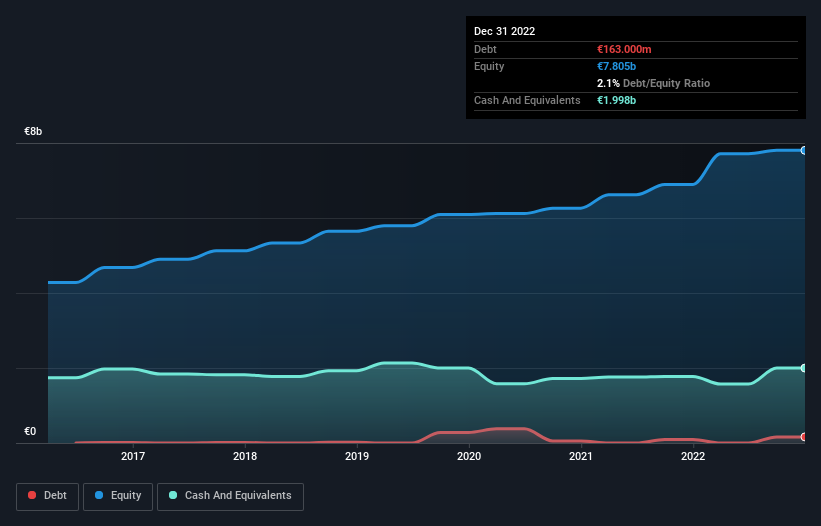
The external fund manager backed by Berkshire Hathaway's Charlie Munger, Li Lu, makes no bones about it when he says 'The biggest investment risk is not the volatility of prices, but whether you will suffer a permanent loss of capital.' So it might be obvious that you need to consider debt, when you think about how risky any given stock is, because too much debt can sink a company. We note that Beiersdorf Aktiengesellschaft (ETR:BEI) does have debt on its balance sheet. But is this debt a concern to shareholders?
What Risk Does Debt Bring?
Generally speaking, debt only becomes a real problem when a company can't easily pay it off, either by raising capital or with its own cash flow. In the worst case scenario, a company can go bankrupt if it cannot pay its creditors. However, a more frequent (but still costly) occurrence is where a company must issue shares at bargain-basement prices, permanently diluting shareholders, just to shore up its balance sheet. Of course, debt can be an important tool in businesses, particularly capital heavy businesses. The first step when considering a company's debt levels is to consider its cash and debt together.
View our latest analysis for Beiersdorf
How Much Debt Does Beiersdorf Carry?
You can click the graphic below for the historical numbers, but it shows that as of December 2022 Beiersdorf had €163.0m of debt, an increase on €95.0m, over one year. But on the other hand it also has €2.00b in cash, leading to a €1.84b net cash position.

How Healthy Is Beiersdorf's Balance Sheet?
Zooming in on the latest balance sheet data, we can see that Beiersdorf had liabilities of €3.76b due within 12 months and liabilities of €782.0m due beyond that. On the other hand, it had cash of €2.00b and €1.71b worth of receivables due within a year. So its liabilities outweigh the sum of its cash and (near-term) receivables by €832.0m.
Of course, Beiersdorf has a titanic market capitalization of €26.8b, so these liabilities are probably manageable. But there are sufficient liabilities that we would certainly recommend shareholders continue to monitor the balance sheet, going forward. While it does have liabilities worth noting, Beiersdorf also has more cash than debt, so we're pretty confident it can manage its debt safely.
Also positive, Beiersdorf grew its EBIT by 24% in the last year, and that should make it easier to pay down debt, going forward. The balance sheet is clearly the area to focus on when you are analysing debt. But ultimately the future profitability of the business will decide if Beiersdorf can strengthen its balance sheet over time. So if you're focused on the future you can check out this free report showing analyst profit forecasts.
Finally, a company can only pay off debt with cold hard cash, not accounting profits. While Beiersdorf has net cash on its balance sheet, it's still worth taking a look at its ability to convert earnings before interest and tax (EBIT) to free cash flow, to help us understand how quickly it is building (or eroding) that cash balance. Looking at the most recent three years, Beiersdorf recorded free cash flow of 49% of its EBIT, which is weaker than we'd expect. That weak cash conversion makes it more difficult to handle indebtedness.
Summing Up
While it is always sensible to look at a company's total liabilities, it is very reassuring that Beiersdorf has €1.84b in net cash. And we liked the look of last year's 24% year-on-year EBIT growth. So is Beiersdorf's debt a risk? It doesn't seem so to us. Above most other metrics, we think its important to track how fast earnings per share is growing, if at all. If you've also come to that realization, you're in luck, because today you can view this interactive graph of Beiersdorf's earnings per share history for free.
At the end of the day, it's often better to focus on companies that are free from net debt. You can access our special list of such companies (all with a track record of profit growth). It's free.
Valuation is complex, but we're here to simplify it.
Discover if Beiersdorf might be undervalued or overvalued with our detailed analysis, featuring fair value estimates, potential risks, dividends, insider trades, and its financial condition.
Access Free AnalysisHave feedback on this article? Concerned about the content? Get in touch with us directly. Alternatively, email editorial-team (at) simplywallst.com.
This article by Simply Wall St is general in nature. We provide commentary based on historical data and analyst forecasts only using an unbiased methodology and our articles are not intended to be financial advice. It does not constitute a recommendation to buy or sell any stock, and does not take account of your objectives, or your financial situation. We aim to bring you long-term focused analysis driven by fundamental data. Note that our analysis may not factor in the latest price-sensitive company announcements or qualitative material. Simply Wall St has no position in any stocks mentioned.
About XTRA:BEI
Beiersdorf
Manufactures and distributes consumer goods in Europe, the Americas, Africa, Asia, and Australia.
Flawless balance sheet average dividend payer.


